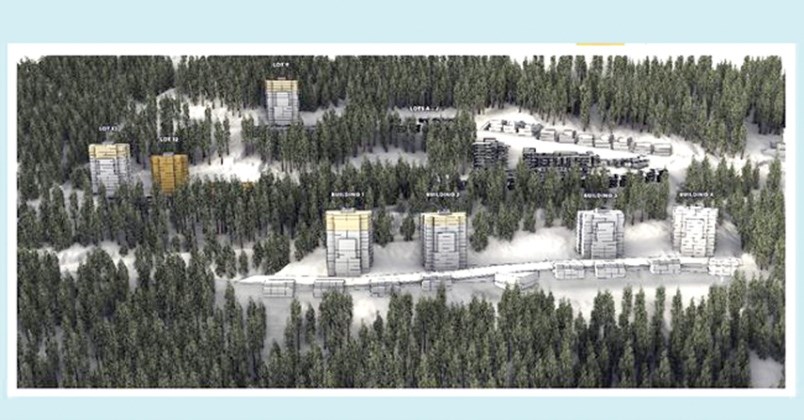This article has been amended since first posting.
Highrises are coming above the highway.
West Vancouver council unanimously supported British Pacific Properties’ long-gestating Rodgers Creek development comprised of 974 homes spread between 17 buildings ranging from three- to 16-storeys. The total includes 699 units for sale as well as a maximum of 275 rental units.
“We need smaller units and we need rental units,” Mayor Mary-Ann Booth explained Tuesday. “I think this is a step in the right direction.”
Many West Vancouver renters, particularly among seniors and single mothers, spend more than 30 per cent of their income on rent, Booth said. The mayor also reminded the gallery that approximately 80 per cent of the municipality’s workforce commutes to a community replete with 1,700 empty homes.
“When people say West Vancouver, ‘It’s a mess because of development.’ That is absolutely false,” she told the gallery. “It’s the opposite.”
Coun. Nora Gambioli gave a history lesson during her remarks, noting the 1931 plebiscite in which district residents overwhelmingly favoured letting the Guiness brewing family – soon to become British Pacific Properties – buy development rights on 4,700 acres above the highway in exchange for building the Lions Gate Bridge.
“They have development rights here that none of us can change now so we need to make the best decisions from the options we have,” Gambioli said.
The municipality approved a 493-unit project on the site in 2008 but following the agreement’s expiration in 2018, council sought a more compact and comparatively affordable development that would maintain the same square footage.
That 2008 proposal should go ahead as planned, argued Nigel Malkin, who previously led the crusade against allowing bus-priority lanes in Ambleside.
“To make drastic changes that they’re asking with just a few information sessions and this single public hearing is fundamentally wrong,” he said, drawing applause despite the mayor’s previous instruction that there be no cheers or jeers during the hearing.
Council’s support is based on numerous reports, working groups, an election, as well as an official community plan that prioritized expanding the diversity and supply of housing, Gambioli said. Drafting the OCP involved more than 100 meetings over 18 months, she added.
“If you weren’t part of helping to create this plan, I don’t know what rock you were hiding under but it’s really difficult to come today and say: ‘I didn’t know anything about it,’” she said.
Gambioli also suggested there is a movement afoot to undermine mayor and council by misleading the public while generating a “populist hysteria.”
Coun. Craig Cameron addressed the notion West Vancouver is in the midst of runaway development.
“We haven’t approved one rotten unit of housing in the last 14 months . . . not a single bedroom,” he said, pounding the table for emphasis. “Are we supposed to start deconstructing houses and planting lawns?”
Not counting lost rental units, the district has added about 22 new rentals per year over the last decade while the population has increased annually by approximately 0.4 per cent over 17 years, Cameron said.
Major projects above the highway might not be finished for 20 or even 25 years, noted former councillor Michael Evison.
“When that’s complete, half of us in this room won’t be here. And I’m one of them,” he added. Evison suggested the project could be well-suited for the next generation of car-sharing, drone-reliant, extremely-online West Vancouver residents.
His optimism wasn’t shared by all. Neil Jensen, who previously opposed the extension of the B-Line bus past Park Royal, described daily traffic jams between Deep Cove and Horseshoe Bay.
“I’m not just opposed to the Rodgers Creek and Cypress Village, I’m opposed to any new development in this community and on the North Shore until such a time that our infrastructure can be improved,” he said.
There are no easy traffic solutions, Cameron maintained.
“Nobody wants to hear about road pricing, nobody wants to hear about dedicated bus lanes, very few people want to hear about living in compact communities.”
While Coun. Sharon Thompson acknowledged the development may mark a disruption, she also suggested the project that could house teachers and first responders.
“It has all the elements that create a livable, connective, healthy way of living.”
In explaining his support, Coun. Marcus Wong discussed the challenges his parents face finding a place to downsize.
“The average home in West Vancouver is $3.3 [million], I’ll be honest, we’re below that,” he confessed. “We’re not a crazy, wealthy family.”
While suggesting he had a bit of an aversion to the height of the towers, Coun. Bill Soprovich also supported the project.
Coun. Peter Lambur did not attend the meeting but previously described the proposal as “an improved form” of a previous agreement.
The development requires one more vote for final adoption.
This article has been corrected to note that West Vancouver's population increased 0.4 per cent per year from 2001 to 2018.



